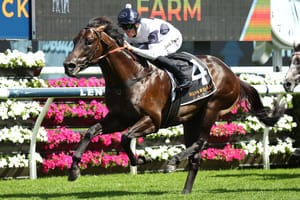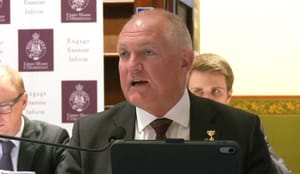The proposed changes to gambling advertising laws in Australia are expected to go to federal cabinet next Monday. Bren O’Brien has examined what is on the table and what isn’t and how it could impact the racing industry.
From the moment Communications Minister Michelle Rowland engaged stakeholders in the debate over gambling advertising over proposed changes to legislation, leaks and rumours have sprung everywhere.
Non-disclosure agreements have proven no barrier to the news cycle feeding mainly off reactions of those looking for a complete advertising ban on online gambling, as had been mooted in the ‘You Win Some, You Lose More’ parliamentary report, released last year.
The reality is that regulatory reform is complex. Social Services Minister Amanda Rishworth said this week at least 21 of the 31 recommendations of that report involve consultation and concessions from state and territory governments, something that will prove politically elaborate, and won’t be resolved in this first tranche of proposed legislation.
Among those is the establishment of a national regulator, or ombudsman for gambling, something which has been kicked down the road.
The other complexity is which reforms sit under the remit of the Communications Minister and which sit under the Social Services Minister.
It is believed that Rowland’s focus has been on online, social, print and broadcast media, while aspects such as on-ground or jersey sponsorship, as well as bonus bets and inducements, fall under Rishworth’s consideration. However, advertising bans on the promotion of bonus bets, inducements and generosities are under Rowland’s domain. It is believed these ads would be banned on anything but racing channels.
There is also a separation between restrictions that will apply to sport wagering advertising and those that will be applied for racing wagering advertising. This ‘carve-out’ as it has been termed, for racing is particularly important.
To give these proposed reforms some context, there are three principles behind the federal government’s approach. The first is to address the saturation of gambling ads, the second is the exposure of children to gambling ads and the third is the gambling promotion during sporting matches.
So what is being reportedly proposed:
Print advertising:
It has been understood throughout this process that wagering advertising in print will not be impacted. There are two reasons for this. Print advertising is not targeted, and rarely used by, children and the print media industry would be significantly impacted should it be banned.
In theory, this should ensure that aspects such as sponsored print formguides are protected. However, no guarantees have been received about this.
Broadcast advertising:
While the ‘You Win Some, You Lose’ report called for a blanket ban on gambling advertising within three years, the reports out of Canberra have been that Minister Rowland has looked to restrict gambling ads on television to two per hour per channel between 6am and 10pm, with total bans around sports events and children’s TV times.
The time frame for this to be brought in would be July 2026 and it would apply to pay-tv or streaming services as well.
This is the most politically divisive of the reforms being discussed. Some politicians, including Labor backbenchers, want a total ban on broadcast advertising. The argument against that, as put forward by senior Labor minister Bill Shorten is that it would be devastating to broadcast companies revenues. Currently around 6 per cent of television ad revenue comes from gambling companies.
So what happens with racing broadcasts?
The Straight understands that the following exceptions have been discussed with racing and wagering bodies surrounding broadcasting, recognising that racing and wagering and intrinsically connected.
Dedicated racing channels, which would include Sky Racing, Racing.com and any free-to-air broadcast, such as the Seven Network on Saturday or the Nine Network during Melbourne Cup week, would be exempt from these restrictions, however they would only be able to advertise racing-related betting products, not sports betting products.
Again, that may change by the time it is put to cabinet.
Online/digital and website advertising:
The proposal is for a blanket ban on wagering advertising online on platforms not owned by wagering companies. It is proposed that it be introduced much quicker than the broadcast ban, as soon as June 2025.
Wagering companies would still be able to advertise on their own platforms, but not third-party platforms like Youtube. The reason for a total ban on online is that it is more likely to be somewhere where children will be exposed to advertising.
Again, a specific ‘carve-out’ is mooted for racing websites. They could host betting advertisements for racing only, much like racing broadcasts. This would likely include betting and industry-related websites that specifically focus on racing, not those that feature sport. It would be the same with YouTube channels and the like.
Interestingly, another exemption will likely occur for paid search, where a wagering company can use specific terms to appear at the top of online searches. They would not be permitted to utilise general terms like football, AFL, NRL etc but would be permitted for a term like “sports betting”.
Social media:
The blanket online ban is expected to be extended to social media, where all forms of advertising are poised to be banned. It is proposed wagering companies would be able to use their own social media platforms to advertise but would not be able to advertise through other accounts.
The possibility of a ‘carve-out’ for racing wagering advertising through social media has been raised in recent days. This would be a significant opportunity, should this eventuate.
Wagering providers have been adamant that they can block advertising by age and so therefore would only target adults through social media.
Outdoor sponsorship and racing club sponsorship:
Outdoor advertising and venue advertising are likely to fall under the domain of the Social Services Minister. With that in mind, a review of that may not occur through this current stage of legislation. However, bookmakers are reportedly happy to wheel back on in-ground and jersey sponsorship if they can get other concessions.
When that reform does happen, it is likely but not guaranteed that racing will get a ‘carve-out’ and race clubs will be free to utilise physical in-venue advertising and related branding such as naming rights.
However, racing bodies have sought certainty on this to ensure it doesn’t get caught up in the discussions about in-ground sponsorship of sport at a late stage.
Bonus Bets and inducements:
A ruling on the future of bonus bets and inducements is likely to come under the Social Service Minister, not the Communications Minister. As such, it is unlikely to be part of this first round of changes. The timeline for the second round of consultations, to be led by Amanda Rishworth, has not been published.
The proposed advertising bans would prevent the promotion of bonus bets, inducements and generosities on anything but racing channels.






